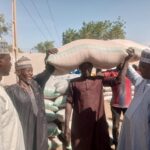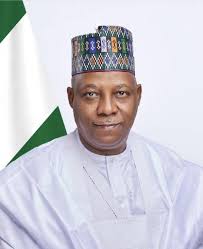By Salisu Sani-Idris
Vice-President Kashim Shettima has given an insight into the reasons for the declaration of the ‘State of Emergency on Agriculture’ by the President Bola Tinubu’s administration.
Shettima spoke at a session on: Country Perspectives: Government-led Strategies and Regional Framework’, at the ongoing UN Food Systems Summit Stocktake (UNFSS+4) in Addis Ababa, Ethiopia.
The News Agency of Nigeria (NAN) reports that the session brought together African leaders and policymakers to share experiences and strategies on strengthening national and local food systems.
Discussions focused on advancing food sovereignty through inclusive policies that promote self-sufficiency, sustainable agriculture, and equitable access to nutritious food.
He stated that any nation that was not independent in the area of food sovereignty, remained not a sovereign country.
According to him, when President Tinubu assumed the mantle of leadership, he met the nation in a very poor state of affairs.
Shettima said: “His Excellency, President Bola Tinubu declared a state of food emergency out of genuine concern for the welfare of our people.
“This is especially in conflict-driven environment like the North-East where Boko Haram is sowing seeds of discord and destruction.
“So, the government came out with some very bold policy guidelines informed by the need to strengthen our food system.
“These include the setting up of the Presidential Food System Coordinating Units.
“The units are mainly not to displace the existing bodies but to coordinate the activities for enhanced food delivery. And issues like the Food Support mechanism in the North East and the North. “
Shettima applauded the World Food Programme and other multilateral agencies for their support to Nigeria.
He stated that in displaced people’s camps, Tinubu’s administration took the initiative to encourage the displaced people to produce their food.
This, according to him, is with a view to giving them resilience, dignity and most importantly to build resilience against shocks.
The vice-president said, “In the Sahelian region, there is an existence relationship between the economy and the ecology and the government has to come up with very robust policies to ensure that our people do not fall into despair.
“Hunger knows no bounds, hunger doesn’t discriminate.
“We are determined to put in place structures, enhance our strategy grains reserve and most importantly to empower small holder farmers, women and youths by giving them incentives.
“Our believe is that our agriculture should be market driven not about handouts. And the whole mantra is about increase in yield.
“Because the entrepreneurial capitalism is embedded in the very psychic of the average Nigerian. “
He added that the whole mantra was on increase in yield, embrace modern agricultural practices, mechanisation, improve seeds and better agricultural practices.
“This is why we are reinforcing our extension services so that our farmers can get up to date data on rainfall patterns to know how to manage the climate shock that is ravaging our parts of the world,” Shettima added.
Earlier, the Deputy Secretary-General of the United Nations, Amina Mohammed, decried that over 37 million children under five who faced acute malnutrition this year were almost the entire population of Canada.
Mohammed said, “But we must ensure the courage to match with long term solution that can result in resilient food system.
“Short term interventions dominate with little connection to the long term development planning solutions we are seeking.
“So, we must choose transformation over dependency. We have good examples nations are embedding resilience into national strategies.
“Leaders are refusing to accept hunger as inevitable instead they combine global, digital and traditional knowledge to accelerate actions towards inclusive and resilient food system.”
She said that the leadership cannot succeed alone, saying, “that must be built on a solid foundation that is rooted on adequate finance, genuine partnership and inclusion.
“We need coordination as a people and not bureaucracies. Bureaucracies are important; we need strong public sector and public institutions, but we do need to coordinate to impact people’s lives.”
Other dignitaries who spoke included the Executive Director, World Food Programme, Cindy Mccain, Salah Jama, Deputy Prime Minister of Somalia, Moubarack Rounbo, Ministry of Agricultural production and Industrialisation, Chad, among others. (NAN)(www.nannews.ng)
Edited by Bashir Rabe Mani












